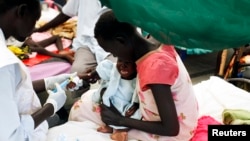Most African countries will not reach the Millennium Development Goals set for 2015 because of the gap between economic and human development. That is one of the conclusions in this year’s annual U.N. report on the Least Developed Countries, presented Thursday.
Junior Davis, U.N. economic affairs officer for Africa, said African countries have not been able to translate their economic growth into structural transformation.
“We think that is the case because these countries have not focused efficiently on building what we call their productive capacities," Davis said. "These are the basic human and economic development capacities that are needed to promote sustainable economic development. And the MDG, as they were constructed, largely ignored the need to develop the productive capacities.”
Slow progress
African countries also are not on course to halve poverty by 2015, and their overall progress on reducing hunger is relatively slow. Poverty limits human development and undermines productivity. And economic development is needed to make gains in human development.
Ethiopia, Rwanda, Uganda and Malawi are the only African countries on track to reach the majority of the development goals. They are making progress because they heavily invested in areas that create sustainable development such as infrastructure, health and education.
The post-2015 development agenda for fragile countries where governance remains an issue — such as South Sudan and the Democratic Republic of Congo — will still largely depend on support from the international community to achieve social and economic development, Davis said.
Improvements in rural development, industrial productivity, agriculture and the services sectors in these countries will require "ways in which we can have a pattern of growth which is not just sustainable but jobs-rich," Davis said. "Because we see the growth in jobs and employment is central to any development strategy that aims to reduce poverty in a sustainable way.”
A country is placed on the Least Developed Countries list based on its per capita income, economic vulnerability, and human development indicators such as health and nutrition.
Of the 48 least developed countries in the world, 34 are in Africa. Three countries have graduated from their least developed status: Botswana, Cape Verde and Samoa.




